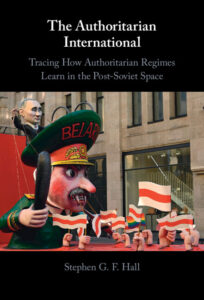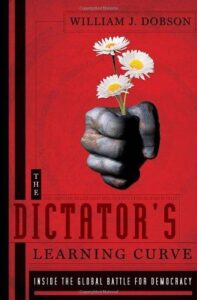 How did so many autocracies come to adopt the same anti-democratic strategies and repressive methods in the same decade? The Washington Post asks:
How did so many autocracies come to adopt the same anti-democratic strategies and repressive methods in the same decade? The Washington Post asks:
The answers are difficult to find — dictatorships are shrouded in secrecy. But Stephen G.F. Hall, a professor at the University of Bath, in Britain, uncovered evidence that the dictators copy, share and learn from one another. His new book, “The Authoritarian International,” looks at how this works. … authoritarian regimes must constantly maintain the illusion of steadfast control. Relax for a minute, and the illusion could vanish. “Protest is like a run on the bank,” Mr. Hall told us. “The protesters only have to get it right once.”
For autocracies, protest and dissent are an existential threat, Hall adds. “They’ve all seen what happens to autocrats generally — the Gaddafi moment, being dragged through the streets and beaten to death with a lead pipe. … They seem to know that if one country becomes democratic in a region, the rest will almost certainly follow. … And the best way to ensure that survival is to learn, to cooperate and to share best practices because you constantly have to stay one step ahead.”

Autocrats have responded to changing circumstances, especially the threat from democratic forces and pressures, by becoming more innovative and inventive, observers suggest.
“Authoritarian regimes are much more brazen than before,” said William J. Dobson, co-editor of the National Endowment for Democracy’s Journal of Democracy and author of “The Dictator’s Learning Curve,” published in 2012. “They are not sitting still.”
@AtlanticCouncil hosts a virtual discussion on “How Should the U.S. Reshape its Russia Policy?” with @DugarRadjana @YHlibovytsky @NEDemocracy‘s @DylanPrimakoff @CFR_org‘s @SSestanovich 10 a.m. June 28. https://t.co/GEANZL9LGG
— Democracy Digest (@demdigest) June 23, 2023
The Atlantic Council hosts a virtual discussion on “How Should the U.S. Reshape its Russia Policy?” with Radjana Dugar-DePonte, representative of the Erhatan Buryat Democratic Movement in the U.S. and Secretary of the executive committee of the Free Nations League; Yevhen Hlibovytsky, partner at Pro Mova; Dylan Myles-Primakoff, senior program manager at the National Endowment for Democracy (NED); and Stephen Sestanovich, senior fellow for Russian and Eurasian studies at the Council on Foreign Relations. 10 a.m. June 28, 2023. Register here.
#Authoritarian regimes must constantly maintain the illusion of steadfast control, @stephengfhall tells @washingtonpost. “The protesters only have to get it right once.” For autocracies, protest and dissent are an existential threat. https://t.co/rsHpA16LXH
— Democracy Digest (@demdigest) June 23, 2023







